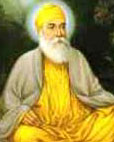
Guru Nanak is founder of the Sikh religion. His goal was to unify the Hindus and Muslims. So he studied both religions and created Sikhism, which combined the best of both. 'Sikh' means 'disciple' and Guru Nanak believed that one can evolve or achieve salvation only through direct contact with a true master or a 'sadguru'. His religion has spread not only in North India but also in America, Singapore and Africa.
Childhood
Guru Nanak was born on April 15, 1469, at Talwandi, 40 miles from Lahore. As a tribute to him, this place is now called 'Nankana Sahib' and is in present Pakistan. His father Kaluchand was a Patwari and his mother's name was Tripta Devi. An astrologer had predicted that Nanak was a born devotee of God and would achieve spiritual heights and be acknowledged by both Hindus and Muslims alike.
At the tender age of 5, Nanak began speaking about God, much to everyone's surprise. He began to study Hindi, Persian, Punjabi and Sanskrit and was adept at all these by the age of 15 years. But most marked was his love for God.
A Charitable Disposition
Nanak's father worried about his future, as he did not seem interested in earning money. He once gave him Rs. 20.00 and sent him to Lahore to start a business. Nanak was accompanied by his constant companion Bhai Bala. En route, they came across some hungry sadhus, who were meditating. Nanak spent all the money he had to feed them. And then returned home. Next, his father sent him to stay with his sister Nanki, in Sultanpur. He started working at a grain shop there, but whatever he earned, he spent on the poor. He did not keep a penny for himself.
At 18 years, he was married to Sulakshana Devi, daughter of Moolchand. His sister convinced him to take care of his domestic life. The couple had two sons. But domestic life was not for Nanak. He had a higher calling and left home in search of the truth. He believed that his true family consisted of loyalty to truth, mercy, happiness, devotion, compassion, peace and adventure. He was accompanied on his search by Bhai Bala and Mardana, a professional singer.
Practical Insights from Guru Nanak
Nanak preferred to eat with the poor than the rich. When asked why, he took two slices of bread, one belonging to a rich man and one to a poor man. When he squeezed the poor man's bread, it oozed milk. And the rich man's bread oozed blood. In this manner he taught that people should make an honest living.
Once, while at Mecca - Medina, Nanak was taking a nap with his feet pointing to the 'Kaba'. An angry moulvi, shifted his feet. And in whichever direction Nanak's feet were shifted the 'Kaba' also shifted. In this way the omnipresence of God was explained.
At Haridwar, Nanak observed people offering water to the Sun. He started throwing water in the opposite direction. On being asked why he was doing that, he explained, that as others were offering water to their forefather's he was offering water to his fields. And if the water could reach the forefathers who had already passed on, it could certainly reach his fields too. In this manner, he explained the futility of rituals.
Guru Nanak's Teachings
Nanak did not subscribe to blind ritualism or mindless superstitions. He believed that there was just one God, who was almighty omnipresent and all encompassing. The chanting of whose name, and a life of purity and charity would lead to freedom from the cycle of birth and death. He believed in the theory of Karma and Rebirth. He spread Sikhism to Burma, Iraq, Tibet and Sri Lanka as a message of love.
The 'Japji Sahib': 'Japji' means morning prayer. He has composed a set of poems that form the first chapter of the Sikh scripture and holy book - the Guru Granth Sahib. These poems talk about meditations and thoughts from his teachings, and serve to inspire many - a - Sikh to live a good life, following the basic principles of prayer, right living and thinking and the Unity of God and our fellow beings.
The End
Guru Nanak passed on in 1538 AD. at the age of 70. His own son did not succeed him. Instead he chose Lelna and renamed him Angad, which means 'my own limb' to be his successor and guide the Sikhs into a new awakening.
No comments:
Post a Comment